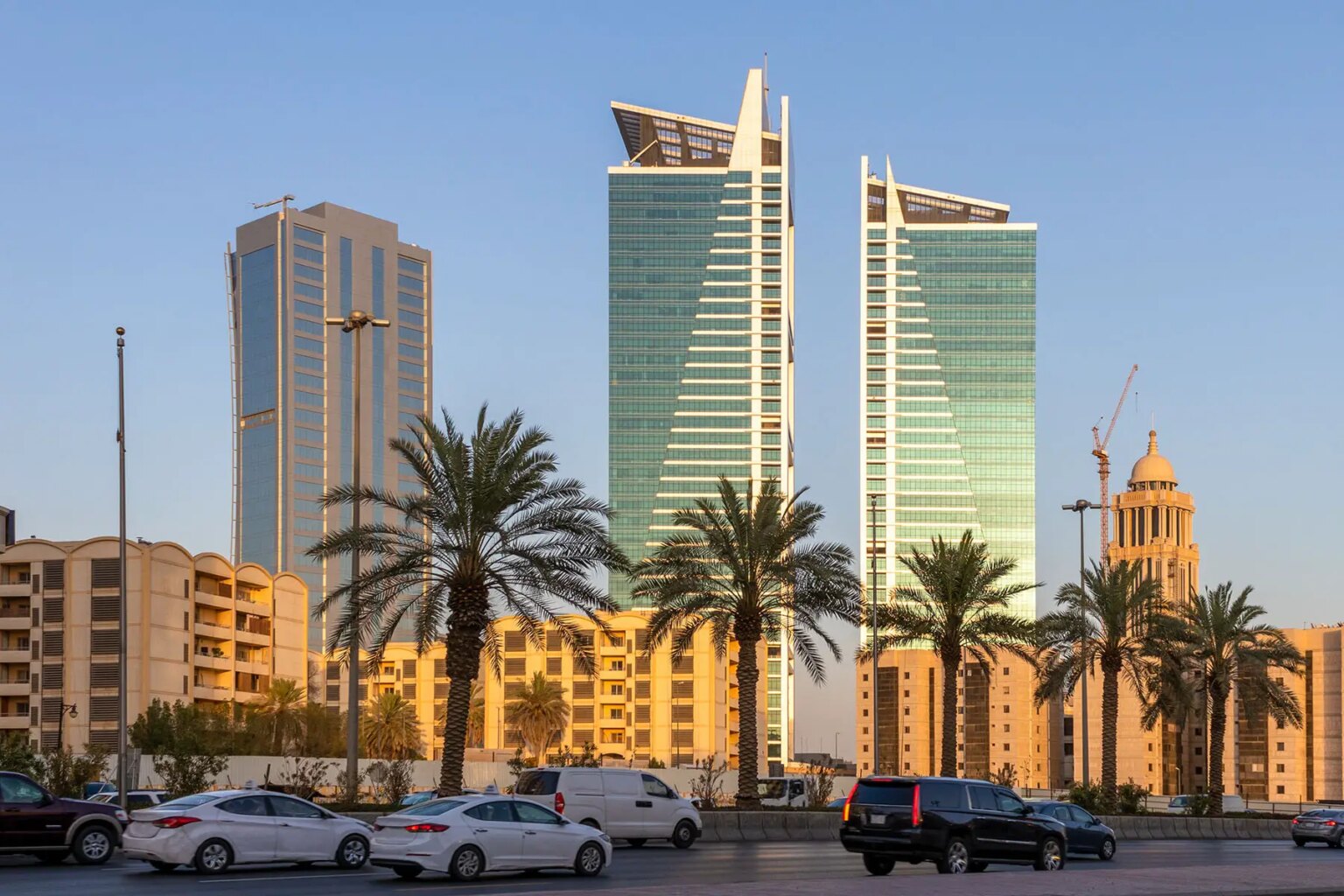Rather than relying on public transportation, most expats moving to Saudi Arabia prefer the freedom of having their own car. And it’s relatively easy to buy one, provided you are an adult with money, a driver’s license, and a resident permit.
Keep reading to learn more about:
- Buying a car in Saudi Arabia
- Who can buy a car in Saudi Arabia?
- Should you buy new or used?
- Where to buy a new car in Saudi Arabia?
- Electric cars and hybrids in Saudi Arabia
- Where to buy a used car in Saudi Arabia?
- Before you can hit the road
- Car costs in Saudi Arabia
- Importing a car in Saudi Arabia
- Selling a car in Saudi Arabia
- Useful resources
Buying a car in Saudi Arabia
Cars are the primary method of transportation in the Kingdom of Saudi Arabia (KSA). While the country has promised heavy investments in public transport by 2030, most residents must rely on driving themselves, hiring a private chauffeur, or using a taxi. With those being the available options, buying a car will be the most cost-effective choice at hand.
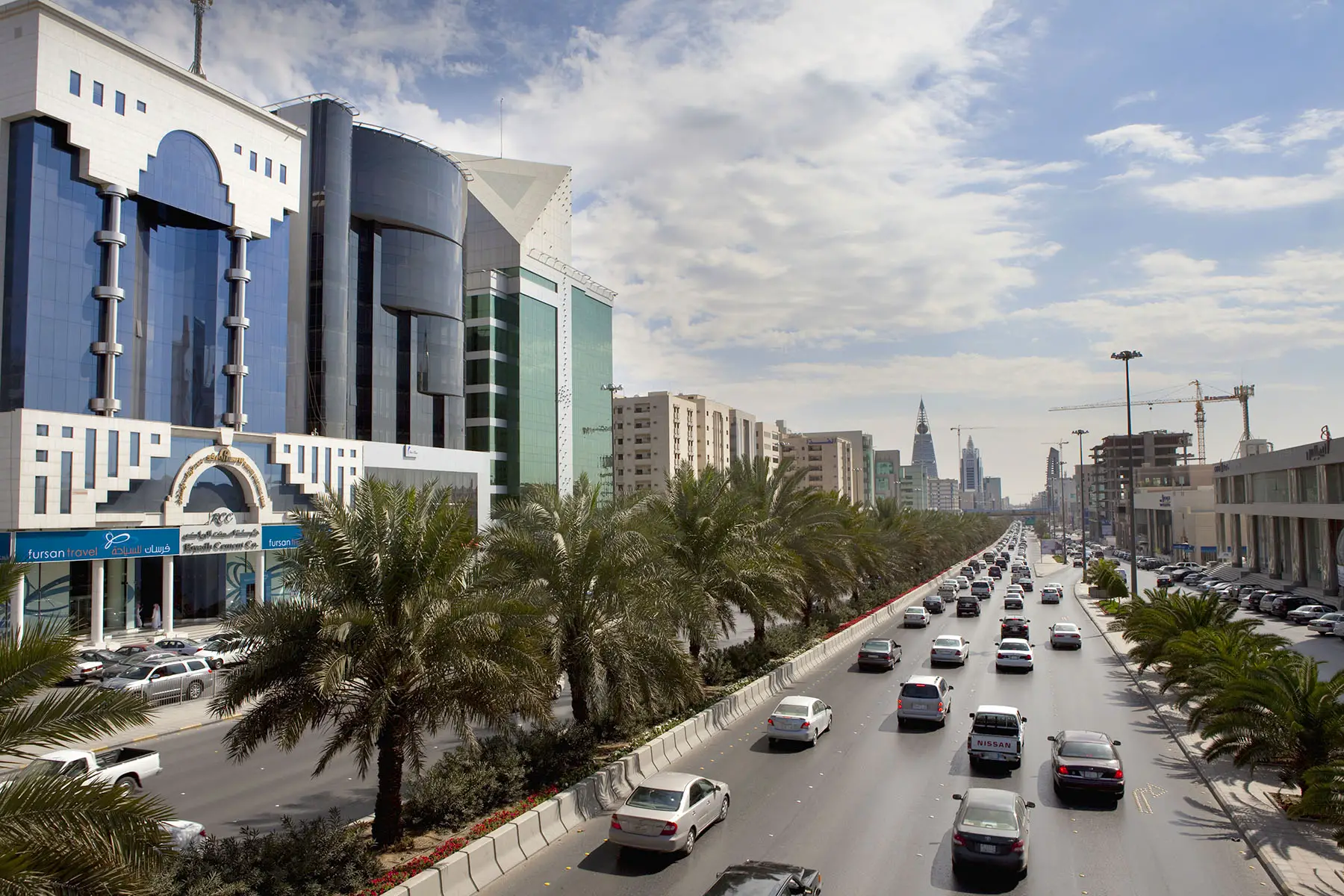
In 2019, the General Authority for Statistics (GASTAT – الهيئة العامة للإحصاء) recorded 156 personal vehicles per 1,000 people. With Saudi’s population reaching 35,8 million people, that calculates to roughly 5,6 million vehicles in total. The most sought-after car is the Toyota Camry (2021). Other popular car brands are the Honda and Hyundai, with Nissan, Chevrolet, and Ford not far behind.
Whether you’re in the market for a new or used car, buying a vehicle in Saudi Arabia isn’t too complicated. In fact, most of the work will be choosing your favorite ride and sorting your finances. After that, you’ll just need to manage the paperwork and vehicle registration.
Driving regulations and car registrations are the responsibility of the General Department of Traffic of the Saudi Ministry of Interior (MoI – وزارة الداخلية).
Who can buy a car in Saudi Arabia?
Saudi Arabia’s legal driving age is 18 years old. Although foreigners and expats are allowed to buy a car, they might run into some trouble when shopping around for one. That is because one legal requirement is having a Saudi driver’s license.
Other required documents differ per seller. However, you’ll generally need to provide copy of your residence permits (تصريح الإقامة) and proof of insurance.
Should you buy new or used?
When it comes to buying a car, some people prefer to buy new. And it certainly has its benefits: new cars have no repair history and come with a warranty. On the other hand, a new car costs far more than a used vehicle. And once you start driving, the car immediately decreases in value, with many depreciating 20% in the first year. And the extreme heat in Saudi Arabia will devalue your new car even faster.
If you’re in the country on a temporary basis, buying a fancy new car may not be the most strategic move as you’ll have to resell it in a few years.
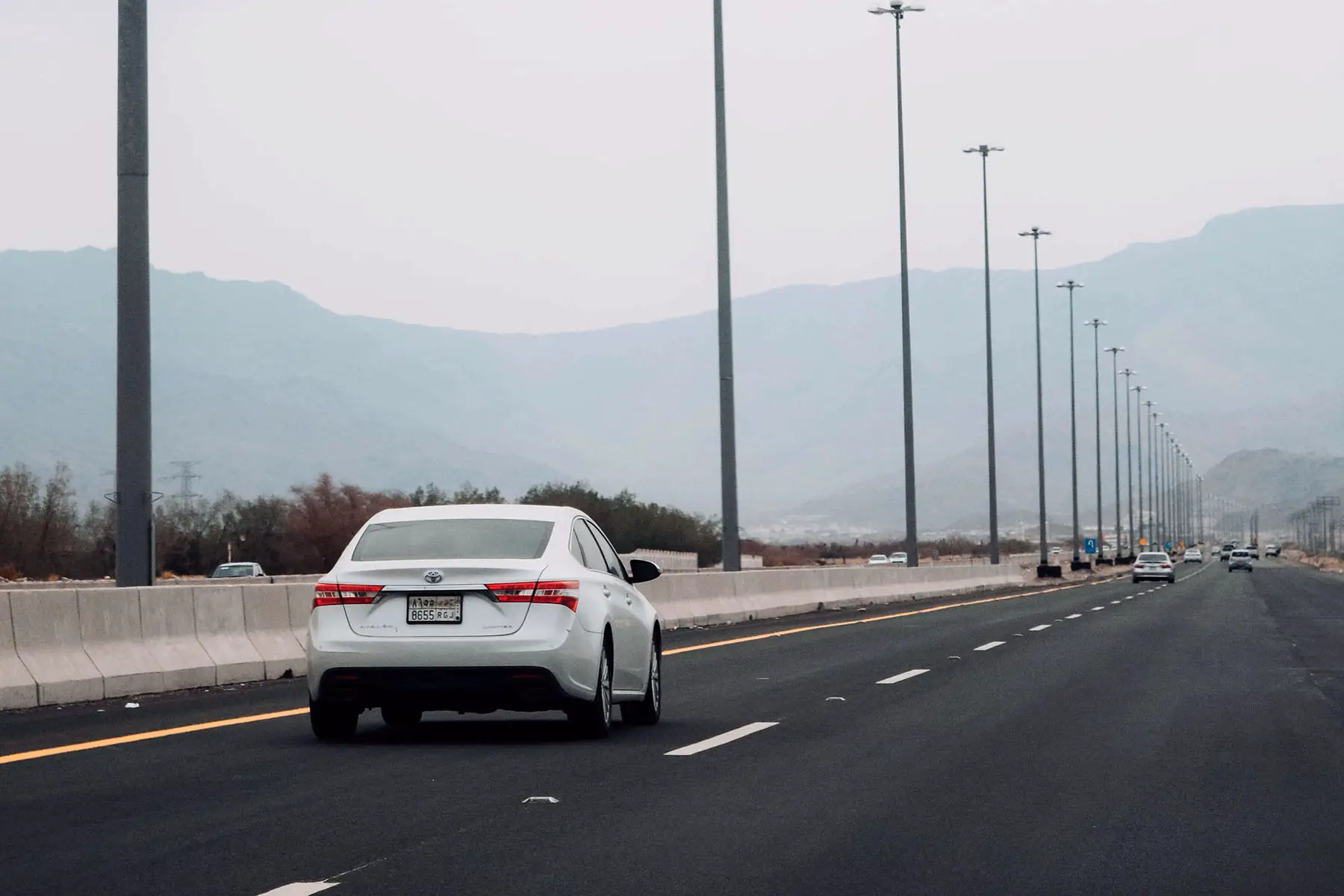
That’s why many expats opt to buy a used car – these also have a better resale value. Keep in mind, however, that used cars also have their drawbacks. The biggest one is that you might not have the complete service repair history, meaning you might be in for a nasty surprise in the future.
Where to buy a new car in Saudi Arabia?
Since cars are so central to Saudi life, you’ll find almost every brand of car on the market. Your best bet is to go through a trusted car dealership that is authorized to sell the brand you are looking to buy. For example:
You can also go through an online aggregator. These show you several offers from different dealerships and present a convenient way of seeing all options available. Keep in mind, however, that stocks may shift faster than websites can be updated, so the information of aggregators is sometimes slightly out of date.
Great aggregator sites in Saudi Arabia include:
Requirements for buying a new car
Once you’ve decided on a car, you’ll need to provide your:
- Saudi driver’s license
- Residence permit
- Insurance policy
- Proof of any car loans you’ve been approved for
In case you don’t have an insurance policy or car loan yet, many reputable dealers can also handle these processes for you.

Writer
Valentine Marie
Insider tip
Don’t forget to negotiate! It isn’t considered rude to ask for a better price, so be sure to advocate for yourself, especially if you can put down a bigger down payment or can pay in cash.
Most dealerships will offer sales and discounts around major holidays like Eid, so it’s a good idea to try and time your purchase around then.
Electric cars and hybrids in Saudi Arabia
Petroleum is very much still integral to the life and economy of the Kingdom, and the oil and gas sector makes up half of its GDP. As such, electric cars – let alone the charging infrastructure they require – are practically non-existent in Saudi Arabia.
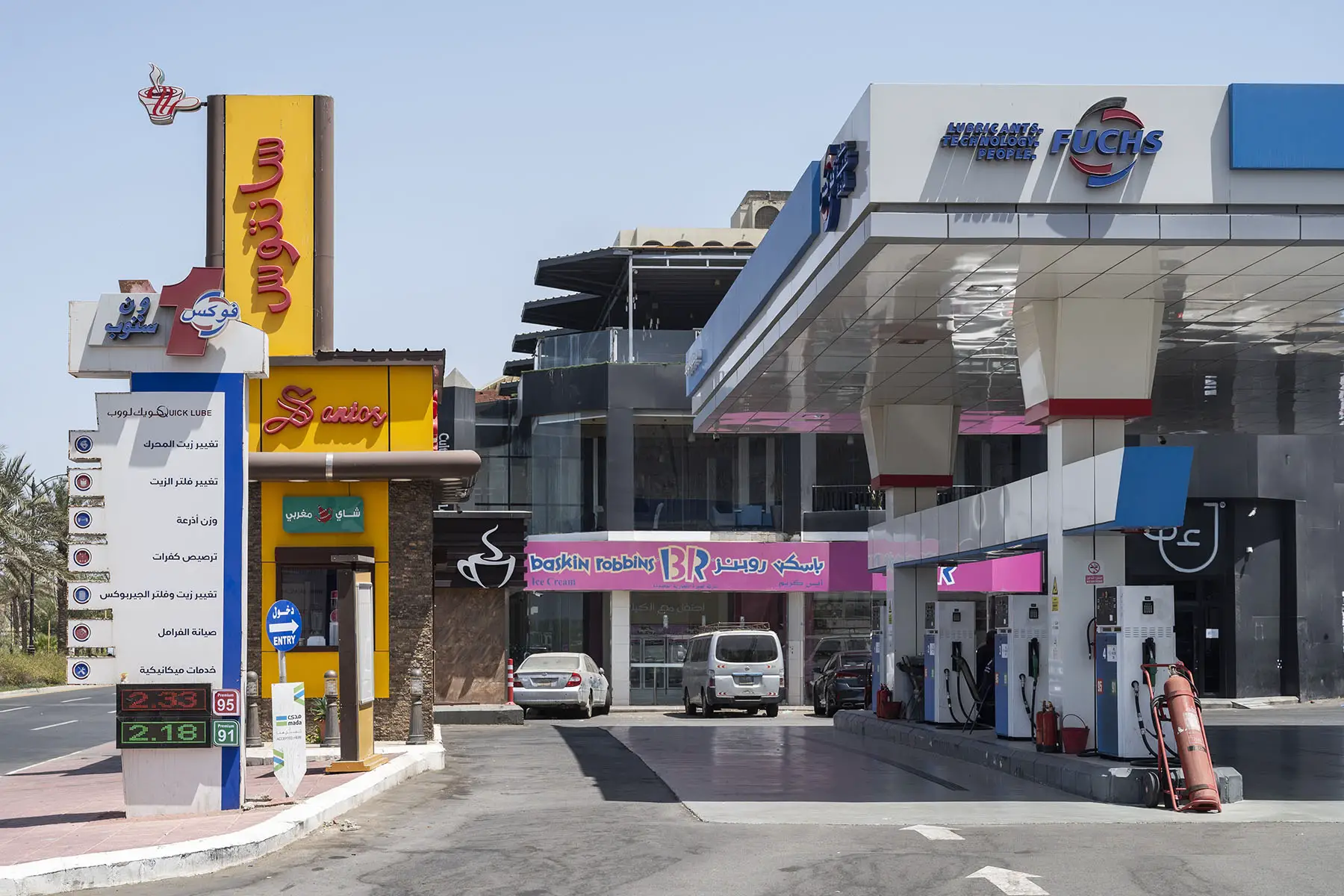
For those who are patient, there is a bright spot, however. In 2022, the government agreed to buy between 50,000 and 100,000 electric vehicles within the next ten years.
Where to buy a used car in Saudi Arabia?
Even if you’re looking to buy used, dealerships are a great option to start with – especially since they can help you with the registration and vehicle inspection. Some great used car dealerships include:
If you prefer, you can also search for used cars online. There are many aggregators that highlight cars sold both by dealerships and private owners. Once you find a car you are interested in, you will need to contact the seller directly. Strong places to start include:
Another option for getting a used car in Saudi Arabia is to buy it from a private owner. If this has your preference, it’s recommended to buy from someone that you know and trust. That way, you’re fairly certain about any current or forthcoming issues with the car.
Requirements for buying a used car
The process of buying a used car looks much like that of buying a new one. The only added step is transferring the registration from the former owner’s name to your name. More on that below.
Make sure the car has passed a FAHAS inspection at a local Motor Vehicle Periodic Inspection (MVPI) site. You or the seller can book an appointment online.
Tips for buying a used car
Pre-owned cars can lead to sticky situations as sellers are less regulated than car dealerships. Things to keep in mind when buying a used car in Saudi Arabia:
- Do a test drive – get a sense of how the car drives
- Get the car inspected – it’s crucial to have a trusted mechanic look under the hood and report back to you
- Get as complete a repair history as you can – speak to the former owner and ask them if they can introduce you to the mechanic who has worked on the car. If you’d like a more official history, you can also use an online platform like Mojaz to review the car’s service history.
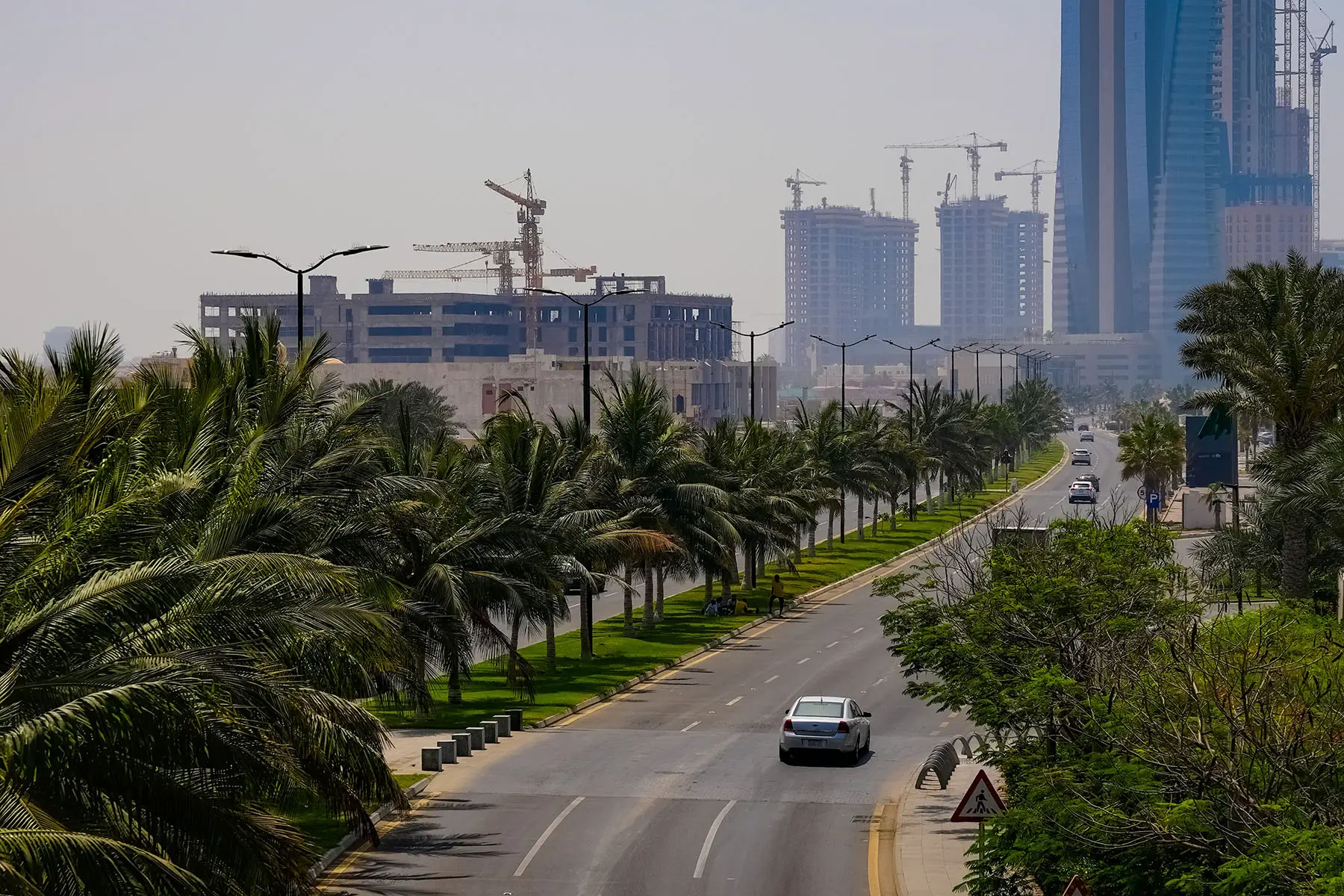
Another great tip is to time your car purchase well. Expats tend to leave the country in the months between May and August, so this is the best time to buy a used car for cheap. New expats usually arrive in the country around September, so this is when a lot of people are looking to buy a car. It’ll be a trickier market and anything you can get will be more expensive.
Before you can hit the road
You must take out third-party liability car insurance (تأمين السيارة) before you can start driving in Saudi Arabia. Additional insurance that covers you for damage, one-vehicle accidents, and theft is optional.
You can find affordable insurance quotes on a comparison site, such as BCare or Gonsure. Top Saudi insurance companies that cater to expats include:
Car registration and other paperwork
Cars must also be registered before you can take it for a spin. If you’re buying a new car, the dealership can help you complete the process. You’ll need to provide:
- Saudi driver’s license
- Letter from your sponsor
- Residence permit
- Proof of insurance
- SAR 100 registration fee
The registration of new cars costs SAR 100 and is initially valid for three years. After that, you’ll have to renew it every year.
If you are buying used, the car registration will need to be transferred to your name. You can do this online on the Absher platform. The required documents are the same, plus a consent form for the sale. The re-registration of used cars costs SAR 150, plus VAT, and is valid for one year.
Once that is done, you can pick up your registration card (استمارة, istimara) from a local branch of the General Department of Traffic.
Equipment every car needs to have
If you’re stopped by authorities, you must be able to present:
- Active car insurance
- Valid Saudi driver’s license
- Current vehicle registration card
- Valid license plate on the front and back of the car
Car costs in Saudi Arabia
There are more costs involved in buying a car beyond the price of the vehicle itself.
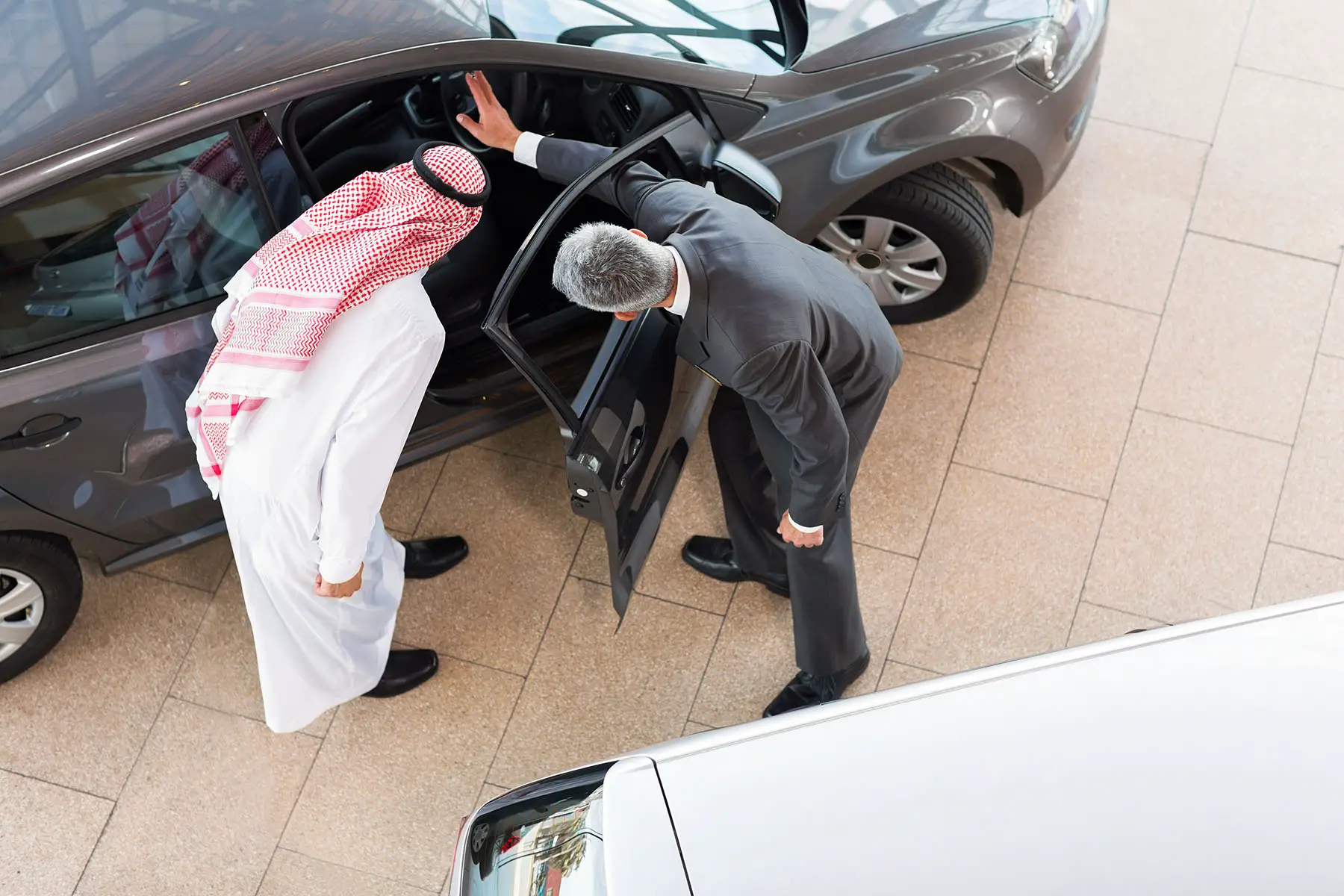
Some of the biggest expenses include:
- Mandatory car insurance – depending on your car and your needs, you can decide between third-party liability and comprehensive insurance. Generally, the former is more affordable. Though annual premiums will vary by the age of the car and the driver’s profile, third-party liability insurance annual premiums usually start around SAR 800; comprehensive insurance premiums start around SAR 2,500.
- Vehicle maintenance – the costs of maintaining a car can be significant. Although it’s impossible to predict which parts need to be replaced – and the cost of the process – general servicing in the Kingdom can range significantly depending on the age and model of the car. Servicing can start anywhere from SAR 500 to SAR 1,500.
- FAHAS inspection – used cars must undergo a FAHAS inspection every year. The cost will depend on the car size but is usually under SAR 100.
- Fuel costs – fuel prices in the Kingdom tend to remain stable and affordable; in July 2023, it was reported to be around SAR 2.18 per liter.
Importing a car in Saudi Arabia
If you already own a car, you can also choose to import it into Saudi Arabia. You can only import one car into the country, and your vehicle must be younger than five years, or older than 30 years if it is a vintage. You can expect to pay a customs tax of 5% of the value of the car and 10% if it’s a truck.
To import a car, you’ll need to provide the following documents:
- Valid passport and entry visa
- Residence permit
- Saudi driver’s license
- Proof of ownership (e.g., the original title deed)
- Original bill of sale showing the value of the car
- Proof of car registration
Pros and cons of importing a car
If you are sure your car can withstand the hot and arid climate of Saudi Arabia, it can be cost-effective to import it. It will save you the hassle of figuring out the car-buying landscape.
That said, many cars – especially cars not tailored for the Arabian Gulf – simply don’t last very long in the desert. Though you won’t see any rust, the undercarriage of the car may start to show damage from the heat. This could lead to increasing repairs that may end up costing more than the initial savings.

It can also take a lot of time to import a car – from finding a removal company and waiting for the car to arrive, to getting a Saudi driver’s license and registering the car. Whether that outweighs the positives depends on your own situation. So, take your time and weigh the pros and cons before deciding what’s best for you.
Selling a car in Saudi Arabia
If you’re looking to sell your car, it’s recommended that you spend some time getting to know the market. This will allow you to set a reasonable price point. You can also offload your vehicle through a dealership; this might get you lower profits, but it’ll be more time-efficient.
The process of selling a vehicle is similar to that of buying one. You’ll need documentation to prove ownership, registration, and insurance, as well as your identifying documents (e.g., driver’s license and residence permit) and an up-to-date FAHAS inspection.
Once you’ve found a buyer, you can transfer ownership online on the Absher platform.
Useful resources
- Absher – e-platform that handles vehicle registrations
- FAHAS stations – official website of the Motor Vehicle Periodic Inspection
- Mojaz – e-platform where you can check a car’s service history
- General Department of Traffic – official government website of the ministry department responsible for cars and registration
